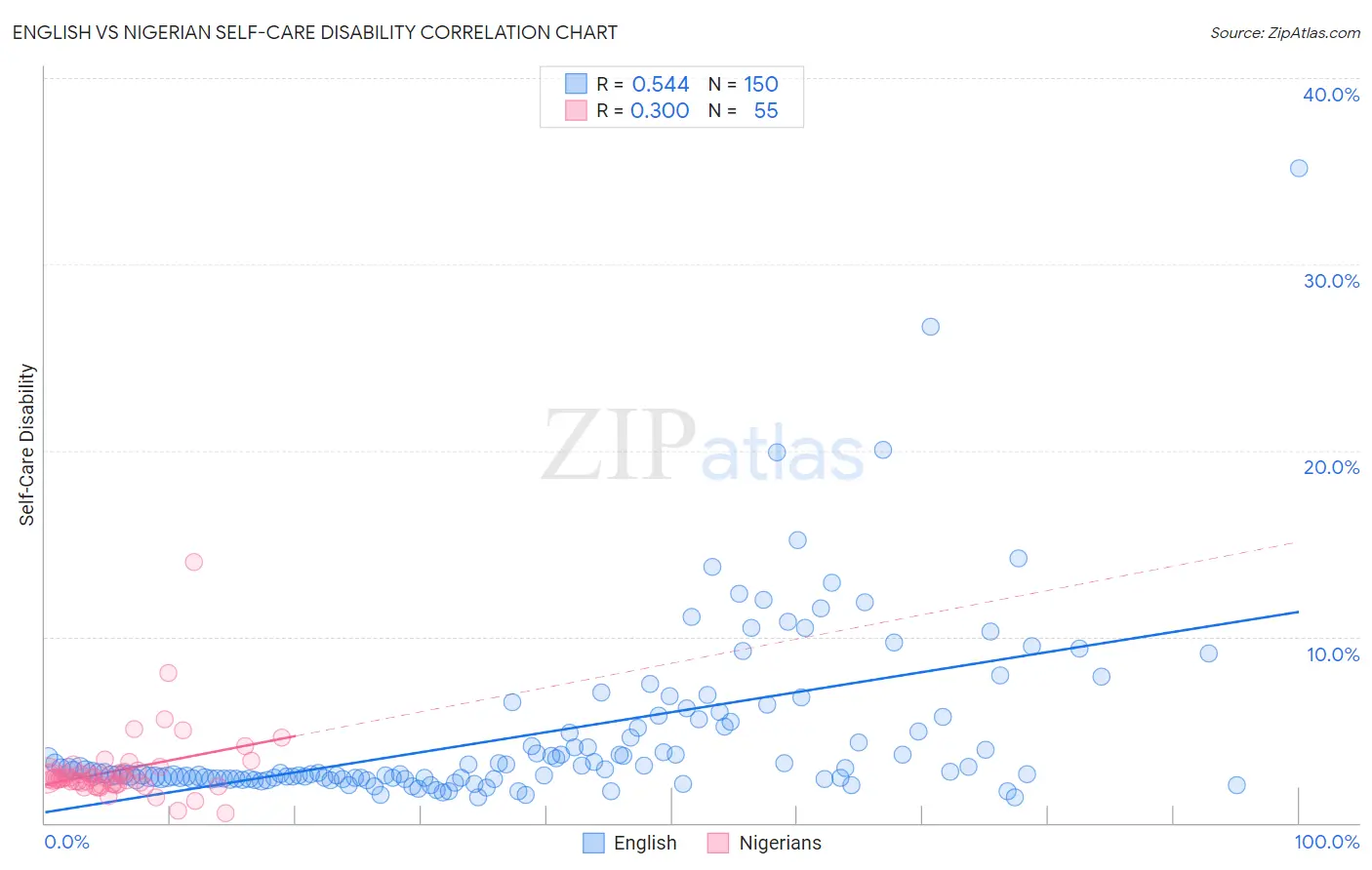English vs Nigerian Self-Care Disability
COMPARE
English
Nigerian
Self-Care Disability
Self-Care Disability Comparison
English
Nigerians
2.5%
SELF-CARE DISABILITY
46.2/ 100
METRIC RATING
178th/ 347
METRIC RANK
2.4%
SELF-CARE DISABILITY
70.6/ 100
METRIC RATING
156th/ 347
METRIC RANK
English vs Nigerian Self-Care Disability Correlation Chart
The statistical analysis conducted on geographies consisting of 576,680,269 people shows a substantial positive correlation between the proportion of English and percentage of population with self-care disability in the United States with a correlation coefficient (R) of 0.544 and weighted average of 2.5%. Similarly, the statistical analysis conducted on geographies consisting of 332,359,271 people shows a mild positive correlation between the proportion of Nigerians and percentage of population with self-care disability in the United States with a correlation coefficient (R) of 0.300 and weighted average of 2.4%, a difference of 1.2%.

Self-Care Disability Correlation Summary
| Measurement | English | Nigerian |
| Minimum | 1.4% | 0.50% |
| Maximum | 35.1% | 14.0% |
| Range | 33.8% | 13.5% |
| Mean | 4.7% | 2.8% |
| Median | 2.7% | 2.4% |
| Interquartile 25% (IQ1) | 2.4% | 2.1% |
| Interquartile 75% (IQ3) | 5.2% | 2.7% |
| Interquartile Range (IQR) | 2.8% | 0.62% |
| Standard Deviation (Sample) | 4.7% | 1.9% |
| Standard Deviation (Population) | 4.7% | 1.9% |
Similar Demographics by Self-Care Disability
Demographics Similar to English by Self-Care Disability
In terms of self-care disability, the demographic groups most similar to English are Immigrants from Kazakhstan (2.5%, a difference of 0.020%), Hungarian (2.5%, a difference of 0.030%), Immigrants from Afghanistan (2.5%, a difference of 0.070%), Immigrants from Bosnia and Herzegovina (2.5%, a difference of 0.16%), and Welsh (2.5%, a difference of 0.18%).
| Demographics | Rating | Rank | Self-Care Disability |
| Pennsylvania Germans | 53.5 /100 | #171 | Average 2.5% |
| Czechoslovakians | 53.5 /100 | #172 | Average 2.5% |
| Immigrants | Burma/Myanmar | 52.8 /100 | #173 | Average 2.5% |
| Welsh | 50.0 /100 | #174 | Average 2.5% |
| Immigrants | Bosnia and Herzegovina | 49.6 /100 | #175 | Average 2.5% |
| Immigrants | Afghanistan | 47.6 /100 | #176 | Average 2.5% |
| Immigrants | Kazakhstan | 46.7 /100 | #177 | Average 2.5% |
| English | 46.2 /100 | #178 | Average 2.5% |
| Hungarians | 45.5 /100 | #179 | Average 2.5% |
| Indonesians | 41.2 /100 | #180 | Average 2.5% |
| Ghanaians | 40.4 /100 | #181 | Average 2.5% |
| Maltese | 37.5 /100 | #182 | Fair 2.5% |
| Salvadorans | 36.4 /100 | #183 | Fair 2.5% |
| Yugoslavians | 36.1 /100 | #184 | Fair 2.5% |
| Slavs | 34.3 /100 | #185 | Fair 2.5% |
Demographics Similar to Nigerians by Self-Care Disability
In terms of self-care disability, the demographic groups most similar to Nigerians are Pakistani (2.4%, a difference of 0.050%), Immigrants from Europe (2.4%, a difference of 0.060%), Italian (2.4%, a difference of 0.090%), Immigrants from Western Europe (2.4%, a difference of 0.12%), and Immigrants from Italy (2.4%, a difference of 0.12%).
| Demographics | Rating | Rank | Self-Care Disability |
| Arabs | 75.7 /100 | #149 | Good 2.4% |
| Immigrants | Costa Rica | 75.1 /100 | #150 | Good 2.4% |
| Basques | 74.0 /100 | #151 | Good 2.4% |
| Tlingit-Haida | 73.5 /100 | #152 | Good 2.4% |
| Immigrants | England | 73.5 /100 | #153 | Good 2.4% |
| Italians | 72.2 /100 | #154 | Good 2.4% |
| Pakistanis | 71.4 /100 | #155 | Good 2.4% |
| Nigerians | 70.6 /100 | #156 | Good 2.4% |
| Immigrants | Europe | 69.6 /100 | #157 | Good 2.4% |
| Immigrants | Western Europe | 68.6 /100 | #158 | Good 2.4% |
| Immigrants | Italy | 68.5 /100 | #159 | Good 2.4% |
| Finns | 67.0 /100 | #160 | Good 2.4% |
| Lebanese | 66.5 /100 | #161 | Good 2.4% |
| Somalis | 63.7 /100 | #162 | Good 2.5% |
| German Russians | 62.7 /100 | #163 | Good 2.5% |